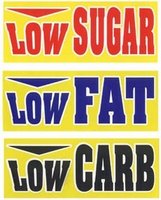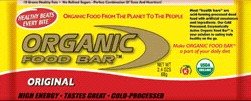
Appetizer
Pay MORE attention to the ingredients in the foods you eat. After analyzing nutrition labels (see “Nutrition Labels Tell An Important Story” for more info), be sure to read the additional information that is often provided.
Something as simple as the list of ingredients is often overlooked when grocery shopping. Ingredients are listed on food packages in descending order by weight, meaning the first ingredient makes up the largest proportion of the food. Check the ingredient list to spot things you’d like to avoid, such as coconut oil or palm oil, which are high in saturated fat. Also try to avoid hydrogenated oils that are high in trans fat.
The ingredient list is also a good place to look for heart-healthy ingredients such as soy; monounsaturated fats such as olive, canola or peanut oils; or whole grains, like whole wheat flour and oats.
Main Course
In addition to the ingredients, food is often labeled with other descriptors that can help you determine which foods are healthier than others.

Free. This claim means that a food contains no amount (or a very small amount) of the these nutrients: fat, saturated fat, cholesterol, sodium, sugar, and calories.
• “Calorie-free” means fewer than 5 calories per serving.
• “Fat-free” means less than 0.5 grams of fat per serving.
 Low. This claim can be used on all foods that can be eaten often without going over the limit for one or more of these nutrients: saturated fat, cholesterol, fat, sodium, and calories.
Low. This claim can be used on all foods that can be eaten often without going over the limit for one or more of these nutrients: saturated fat, cholesterol, fat, sodium, and calories.
• “Low-saturated fat”: 1 gram or less per serving.
• “Low-fat”: 3 grams or less per serving.
• “Low-cholesterol”: 20 milligrams or less and 2 grams or less saturated fat per serving.
• “Low-sodium”: 140 milligrams or less per serving.
• “Low calorie”: 40 calories or less per serving.
Other words that mean “low,” include: “little,” “few,” and “low source of.”
 Lean and Extra lean. These claims can be used to describe the saturated fat and fat content of meat, poultry, seafood and game meats.
Lean and Extra lean. These claims can be used to describe the saturated fat and fat content of meat, poultry, seafood and game meats.
• “Lean”: less than 10 grams of fat and 4.5 grams or less of saturated fat, and less than 95 milligrams of cholesterol per serving.
• “Extra lean”: less than 5 grams of fat, less than 2 grams saturated fat, and less than 95 milligrams of cholesterol per serving.
Even though choosing foods with these claims can be a smart choice, watching your serving size is still important. Just because something is “reduced fat” or “lighter” in calories, does not mean than you can eat more of it. By eating a larger portion of a food low in saturated fat, you may end up eating more or just as much saturated fat as if you had eaten the regular version.
Sources: American Diabetes Association; National Heart, Lung, & Blood Institute
Dessert
Once I started really paying attention to the ingredients in my favorite foods, I realized that not only was I eating a ton of sugar (disguised as ‘high fructose corn syrup’), I was also eating a lot of things that I’ve never even heard of.
I automatically trusted that the food I was eating was generally OK since I got it at the grocery store, but I’ve since learned that much of the stuff that we eat every day is full of things that won’t kill you on contact (which is why it can be sold), but can kill you slowly by adding extra pounds, raising your blood pressure, and clogging your arteries (which is why we have to be educated & make smart choices).
One of my biggest problems is that I’m always on the go, so sometimes I need pre-packaged snacks that I can easily throw in my purse or leave in the car. Unfortunately, I found many of these foods to be the main culprits of adding a bunch of fattening and gross-sounding stuff under the radar.
 One the foods that I’ve found to be a life saver is the Organic Food Bar. This yummy bar is available in 8 flavors, and it is made with NO preservatives, additives, salt, coatings, or refined sugar. It also happens to be 100% organic and 100% vegetarian.
One the foods that I’ve found to be a life saver is the Organic Food Bar. This yummy bar is available in 8 flavors, and it is made with NO preservatives, additives, salt, coatings, or refined sugar. It also happens to be 100% organic and 100% vegetarian.
More importantly, this bar is made of things that I’ve actually heard of:
Almond butter, date paste, honey, brown rice protein, flax sprouts, quinoa sprouts, raisins, sesame seeds.
About Cafe Physique:
The mission of Café Physique is to help clients reach and exceed their personal fitness and nutrition goals. If you’re in need of an a nutritionist in Atlanta or an Atlanta personal trainer – Café Physique is the perfect solution. We offer Atlanta yoga instruction, Atlanta prenatal workouts, and Atlanta personal training. We also have private sessions of pilates that Atlanta residents are raving about. We invite you to let a member of our Atlanta registered dietitian staff or personal training team develop and implement a realistic and healthy lifestyle plan to meet your personal goals.

